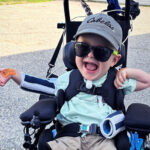Navigating school with a neuroimmune condition

Fifteen-year-old Sarah had been challenging her dad to card games all week — and on Saturday, she finally beat him. It might seem like just good-natured competition to most people. But for Sarah, it was a much greater accomplishment: The teenager was coping with the lasting cognitive effects of autoimmune encephalitis and had struggled with her short-term memory.
“The games helped Sarah get her brain active again in a fun way by memorizing the numbers on the cards,” explains Kitty Petty, an education specialist in Boston Children’s Neuroimmunology Center. The recommendation is just one of many strategies that Petty and her colleagues use to help support kids with neuroimmune conditions.
An individualized approach to educational support
Neuroimmune conditions include autoimmune and infectious diseases that affect the brain and spinal cord, such as multiple sclerosis, encephalitis, and optic neuritis. Because such conditions typically cause brain inflammation, kids often experience cognitive and behavior difficulties even after treatment.
“Every child is different, so we take a really individualized approach,” explains Petty, whose goal is to help the Center’s kids and families navigate the challenges that can occur surrounding school and learning. Here, she explains how children with neuroimmune conditions can benefit from educational support at every age.
Preschool
Young children who have been very sick with a neuroimmune condition can develop significant behavioral problems. “We give parents positive strategies to help deal with meltdowns and other issues,” says Petty. She and her colleague also suggest accommodations for preschoolers, help parents learn how to soothe their preschooler, and offer suggestions about how to make learning fun.
Elementary school
It’s crucial that children with neuroimmune conditions return to school as soon as they can to maintain a sense of normalcy and avoid falling too far behind educationally and socially. That doesn’t necessarily mean full attendance: Some kids may need to transition back slowly with just one class a day at first, while other may need to start with afternoon classes because they’re too tired in the morning. If kids are too sick to attend school regularly, Petty and her colleague work with families to write a letter to the school explaining the child’s medical diagnosis and offer possible school accommodations. They also help parents access home tutoring support and review IEPs and 504 plans when needed.
Middle and high school
Older children with neuroimmune conditions may avoid school even when they don’t feel physically ill because of the emotional and social challenges that can accompany these disorders. In these cases, the physicians in the Neuroimmunology Center may refer patients for graded exercise therapy or cognitive behavioral therapy to help get their bodies and minds moving again. “It’s important that older kids and teens try to return to school in some capacity as soon as possible,” says Petty.
College
Educational guidance doesn’t have to end when patients enter college. Petty provides college students with suggestions that can include advance copies of professors’ notes and the option to take untimed tests. Such continued support allows kids and families to build long-term relationships with Petty and her colleagues. “I started seeing one child when he was 5,” she says. “Now he’s 25.”
An individualized education program (IEP) is a legal document that identifies the needs of a student who requires special education and outlines supports and services that can help that child succeed in school. A 504 plan is similar but applies to children who require accommodations and supports but not special education. Both apply to eligible children in U.S. public schools.
Learn more about the Neuroimmunology Center.
Related Posts :
-

After a severe case of myelitis, ‘rockstar’ Maxwell is on the move
When Maxwell Lazarz’s mother, Jennifer, tells him he’s a rockstar, he just laughs and asks her what that ...
-

‘They never stopped trying to figure out what was happening’: RyennAnne’s encephalitis journey
When 5-year-old RyennAnne Hurst developed a bad sore throat last summer, her doctor thought she might have strep and prescribed ...
-

No limitations: How Flora found answers for MOG antibody disease
Flora Ringler’s fifth birthday didn’t turn out as she had hoped. She and her family were vacationing in ...
-

‘A lot better now’: Andrew’s recovery from Rocky Mountain spotted fever and a stroke
When Andrew was bitten by a tick in 2021, he and his parents could hardly have imagined that just a month ...





